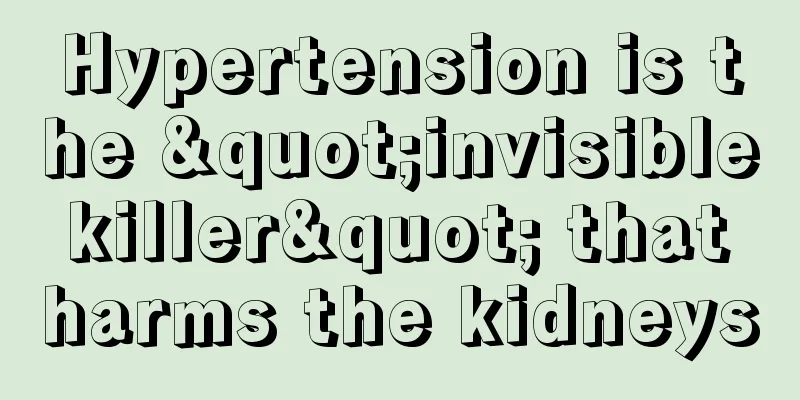Hypertension is the "invisible killer" that harms the kidneys

|
Patients with hypertension not only have high blood pressure, but also suffer damage to many important organs in the body, such as the heart, kidneys, brain, eyes, and large blood vessels throughout the body. High blood pressure can cause damage to many important organs throughout the body. Damage to these organs caused by high blood pressure often leads to serious consequences, such as stroke, myocardial infarction, heart failure, renal failure, etc., and can even be life-threatening. High blood pressure can cause kidney damage Why does high blood pressure cause kidney damage? This is because the glomeruli, which are the main components of the kidneys, are actually many capillary glomeruli. They are very sensitive to changes in blood pressure and are the direct recipients of blood pressure changes. Hypertension patients will cause "three highs" in the glomerulus It's like a sieve. If the pressure on one side increases, more things will be sifted out. If hypertension persists, the structure of this "sieve" itself will change, leading to glomerular sclerosis. At the same time, the renal tubules and renal interstitium will also be damaged, thus affecting kidney function and eventually developing into uremia. Clinical manifestations include foamy urine and increased nocturia The clinical manifestations are foamy urine, increased nocturia, and in severe cases, symptoms such as edema, fatigue, nausea, chest tightness, and shortness of breath. Kidney disease can also cause high blood pressure The two are closely related and influence each other, forming a vicious cycle. Hypertension causes a high incidence of cardiovascular and cerebrovascular damage Studies have found that the incidence of cardiovascular and cerebrovascular damage caused by hypertension in patients with kidney disease is much higher than that in people without kidney disease.
Patients with hypertension should undergo regular urine routine examinations and other related tests. So, how can patients with hypertension detect kidney damage early? And how can patients with kidney disease control hypertension? First of all, for patients with hypertension, regular urine routine, urine microalbumin, serum urea, creatinine, cystatin C, renal B-ultrasound or renal ECT and other examinations should be performed to detect kidney damage as early as possible and receive timely treatment. Blood pressure control reaches target in patients with chronic kidney disease and hypertensionSecondly, for patients with kidney disease, it is important to monitor changes in blood pressure and actively seek treatment. Third, for patients with chronic kidney disease and hypertension, blood pressure control should meet the standard: the target value for urine protein>1g/day is 125/75mmHg; for urine protein<1g, 130=80=> Attention should be paid to lifestyle adjustments Fourth, attention should be paid to lifestyle adjustments, including losing weight, reducing sodium intake, reducing fat intake, quitting smoking, limiting alcohol consumption, and exercising moderately. Take blood pressure medication under the guidance of a doctor Fifth, antihypertensive drugs should be taken under the guidance of a doctor. The principle of antihypertensive treatment is to start with a small dose, preferably long-acting preparations, combination medication and individualized treatment, and regular follow-up should be carried out during the medication process. Avoid misunderstandings such as "taking medicine without measuring blood pressure", "not taking medicine unless you feel uncomfortable", and "not taking medicine scientifically according to your condition". Do not blindly follow certain blood pressure lowering devices or abuse "folk remedies" Sixth, learn about hypertension and kidney disease and follow your doctor's advice. Do not blindly follow the promotion of certain blood pressure lowering devices or take "folk remedies" indiscriminately. Keep a good mood Seventh, blood pressure is also easily affected by factors such as environment, activities, emotions, etc. and fluctuates in harsh environments such as crowding, noise, sudden drop in temperature, cold, disasters, strenuous exercise, dangerous work, excessive work, stress and fatigue, etc. Emotional excitement, jealousy, anger, excessive mental stress, etc. can cause a sudden increase in blood pressure, so you should be careful to avoid them. |
<<: How to prevent cancer: 12 golden rules to fight off cancer
>>: The 19 foods with the strongest detoxification function
Recommend
Why is phlegm yellow?
It is very uncomfortable to produce phlegm, espec...
Key points for diagnosing skin cancer
The key points in diagnosing skin cancer are as f...
What can I eat during breast cancer chemotherapy? Are there any side effects during breast cancer chemotherapy?
Cancer usually has many side effects during chemo...
Ovarian Cancer Types
Ovarian cancer is very complex. There are many ty...
Can I eat loofah frequently during pregnancy?
We all know that pregnant women should get more r...
Causes of rectal cancer
Now is an era of rapid development of information...
Can stomach cancer be detected through physical examination?
Can stomach cancer be detected through physical e...
How to relieve vomiting caused by gastroenteritis
Although modern people's living conditions ha...
Waist and abdomen core strength training method
Recently, many people's fitness is not very g...
What to do if the tattoo cannot be washed off? They can help you
A suitable tattoo can create a more beautiful app...
Common causes of teratoma
Speaking of teratoma, I believe you will show an ...
Autumn health care to achieve 6 "harvest"
The energy of heaven and earth always has tempora...
What causes itchy bumps on arms?
If small bumps appear on your arms and they are v...
What to eat for ovarian tumor
Although ovarian malignant tumor disease does not...
What is the best treatment for small cell lung cancer
Due to the incomplete understanding of small cell...









